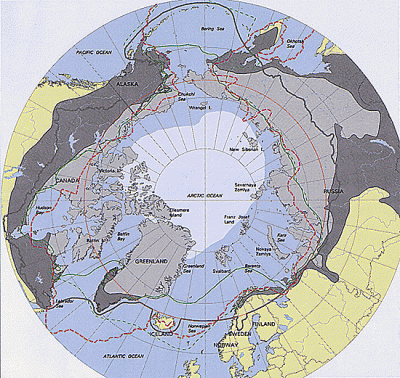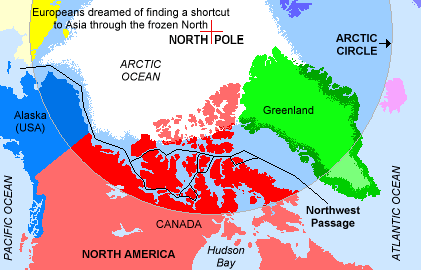“Climate Change – Smoke Screen in Arctic Geopolitical Play”

The US global military agenda pertains to the gas and oil rich Arctic region, says Michel Chossudovsky, from the Centre for Research on Globalization. Unlike other states with claims to the region, it doesn’t have territory extending into the Arctic Ocean, he adds.
RT: President Barack Obama attended Monday a US-led international conference on the Arctic, held in Anchorage, Alaska. The White House was promoting the trip as part of Obama’s push for climate change action. How important is the Arctic region and this meeting in particular for the US?
Michel Chossudovsky: First we have to understand that this [conference] is a US initiative which emanates from the US State Department. The organizational structure is the State Department which is not an entity concerned with environmental issues – it’s concerned with geopolitics.
The agenda has been announced as focusing on climate change and the environment. But I would suspect that the hidden agenda behind this conference is ultimately to develop the Arctic on behalf of the Anglo-American oil giants. There are extensive Arctic oil and gas reserves. This is not the official agenda, but ultimately that is the end game and the fact that it is under auspices of the State Department, to start with, points to the nature of confrontation which may exist between the West, on the one hand, and the Russia Federation, on the other.
#GLACIER reinforced that all must #ActOnClimate; it is our collective responsibility. http://t.co/gC0l0r12GH pic.twitter.com/RCWubV4yO4
— John Kerry (@JohnKerry) September 1, 2015
RT: How strong is the US position in the ongoing competition for the Arctic compared to the other seven members of the Arctic Council?
MC: First of all, the US from a geographic point of view is in a difficult situation, because contrary to Canada, Denmark, Norway, and the Russian Federation – the US doesn’t have any territories extending into the Arctic Ocean. It has territories above the Arctic Circle, but the Arctic Circle is not a geographic boundary, it is a climatic boundary. And the US does not have any adjacent territories to the Arctic Ocean.
Now how does Washington proceed in that regard? Essentially it proceeds through its economic, military and strategic alliances particularly with Canada, but also with Denmark and Norway, In relation to Denmark, we are talking of course about Greenland, which extends right up to the Arctic Ocean.
And Washington already has military bases in the Northern Territories of Canada under joint command with Canada, but it also has military facilities in Greenland. I suspect that this essentially is their gateway to the Arctic.
They have another of course disadvantage – is that the US is not a member of the United Nations Convention on the Law of the Sea. And as opposed to other members – Canada or the Russian Federation- both countries have in fact made claims based on the fact that the continental shelf extends right into the Arctic Ocean. There we have a geopolitical situation. Within the Arctic region, according to the estimates something of the order of one quarter of the world’s oil and gas reserves. This is even corroborated by US sources.

© Valeriy Melnikov / RIA Novosti
And at the same time, we have environmental considerations because any kind of opening up of oil and gas exploration above or within the Arctic Ocean would have devastating environmental consequences. And we could just look at what happened in the Gulf of Mexico with the BP disaster a few years ago. This of course is contemplated, and the US has recently granted exploration rights to oil companies above the Arctic Circle in areas which are contiguous to Alaska.
RT: Arctic Council members at their recent meeting were unanimously calling on cooperation and mutual trust from all sides when it comes to the development of the region. The White House was promoting Obama’s Alaska trip and the Anchorage gathering as part of Obama’s push for climate change action. What do you make of those statements, are these real concerns?
MC: First of all, this venue is not sponsored by the Arctic Council. Although, the US this year chairs the council. This particular initiative presents the issue of climate change and environment as the central concern. At the same time there is conflict in the Arctic between the US and NATO, on the one hand, and the Russian Federation on the other. Of course this is always somewhat contradictory. At one level they are going to stress climate change, and on the other they are going to deploy military exercises in the Arctic region which in a sense is also part of the broader process of confrontation between Russia and the Western military alliance with regard to Ukraine and also in the Middle East.
.@POTUS on choosing the path to #ActonClimate: is not a danger to be avoided, this is an opportunity to seize. http://t.co/cehIYqHSgY
— Department of State (@StateDept) September 1, 2015
In other words, the US has a global military agenda. And that global military agenda is not limited to the Middle East or Eastern Europe. It also pertains to the Arctic region. Why? Because the Arctic encompasses, according to estimates 25 per cent of the World’s oil and gas reserves. But of course for Washington to gain control over those oil and gas reserves it is threatening countries in one form or another, particularly in view of the fact that it doesn’t have any territories within, and I insist, within the region of the Arctic Ocean.
The Arctic Ocean is a geographic boundary; the Arctic Circle is in fact an irrelevant concept because it is based on climate and on sunsets, and so on. They are using the Arctic Circle as a definition when in fact we look at the map, we see that the USA (Alaska) doesn’t have any borders with the Arctic Ocean.
So there is a geopolitical play on the one hand, and then there is always global warming, climate change, which is put forth as a smoke screen.
I should mention that the environmental issues are absolutely fundamental with a view to protecting the ecology and the natural habitat of the Arctic region. That will require very strict rules on offshore drilling for gas and oil reserves and the development of other resources in that region.
LISTEN MORE:
–
Michel Chossudovsky is an award-winning author, professor of economics (emeritus) at the University of Ottawa, founder and director of the Centre for Research on Globalization (CRG), Montreal and editor of the globalresearch.ca website. He is the author of The Globalization of Poverty and The New World Order (2003) and America’s “War on Terrorism” (2005). His most recent book is entitled The Globalization of War, America’s Long War against Humanity (2015). He is also a contributor to the Encyclopaedia Britannica. His writings have been published in more than 20 languages.


